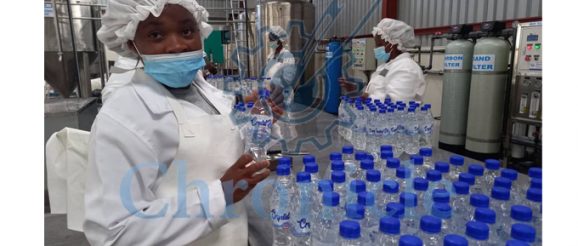Midlands State University innovation hub makes $112 million profit | The Chronicle

The Chronicle
Patrick Chitumba, Midlands Bureau Chief
MIDLANDS State University (MSU) has realised $112 million profit from products made at its industrial park and its latest offering, Nature Burst juice made from mangoes, oranges and guavas is proving to be popular on the market. In line with value addition being promoted by the Government, the university is producing juice as opposed to selling the mangoes, oranges and guavas as fruits.
The university Innovation Hub in Senga suburb is where students, researchers, creators and innovators nurture ideas into industry-changing products that are then produced at the industrial park. Students and full time employees work at the industrial park located in the Midlands capital’s Heavy Industrial site.
Midlands State University
The university has so far this year made a profit of $112 million from its innovations and the recent introduction of Nature Burst juice is expected to further boost profits. President Mnangagwa in 2020 unveiled the university’s industrial park which houses the clothing and textile enterprise, chemical manufacturing unit, a food processing plant and the press and publication unit.
It is at the food processing plant where Nature Burst is produced from fruits from the university’s farm. The university also bottles water at the food processing plant and plans are underway to make juice from other fruits such as Wild Loquat Fruit. Under the textile department, the university makes work suits and other protective clothing for industry while the chemicals department is into massive production of hand sanitisers and hand wash and degreasers for industry.
The press and publication unit has published the Constitution in all the country’s 16 official languages among other publications. Government has directed all State universities and technical colleges to have Innovation Hubs to support industrial parks as institutions of higher learning take an active role in the country’s industrialisation programme.
The MSU industrial park now has 290 full time employees taken from the community as the university leads from the front in employment creation. MSU director of enterprises Mr Alex Mukwembi said the Nature Burst juice is proving to be very popular.
“I am glad to note that as MSU Industrial Hub we are now producing juices from oranges, mangoes and guavas. We have introduced a drink called Nature Burst which is our latest product on the market,” he said.
MSU director of enterprises Mr Alex Mukwembi shows some of the detergents made at the Industrial Park
The MSU exhibition stand at the just ended Midlands Show that was held at Gweru Showground was very popular with people visiting to sample the juices which were on display. Mr Mukwembi said students from the Food Science and Technology department on work related learning and their lecturers played a huge role in the value addition of the fruits.
“The mangoes, oranges and guavas are from our farm and instead of selling them as fruits we are now producing juices which is the value addition that Government is talking about,” he said.
Mr Mukwembi said the food processing plant like other sections of the industrial park was creating new jobs.
“Our students on work related learning are not only benefiting from work-related learning experience but are also producing for the university.
Mr Alex Mukwembi
“We are working on substituting imported drinks, pharmaceutical products and even tooth picks. We want to make sure we substitute as many products as possible to save the country the much needed foreign currency,” he said.
Mr Mukwembi said there are plans to make juices from wild fruits found across the country.
“We have many indigenous fruits that we can value add by producing juices,” he said.
Mr Mukwembi said they were also in the process of making fertiliser from fruit peels that are left after squeezing the juice. He said there are however, challenges they are facing mostly to do with buying materials from their competitors.
“This is the reason why we want to ensure that most of the materials we use such as bottles, tops and labels are produced from within. The press and publications unit for example is now making the labels for our products,” said Mr Mukwembi.
